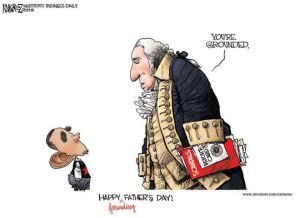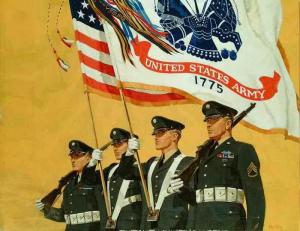 George Washington was a gambling man. Although the Father of Our Country once called gambling “the child of avarice, the brother of iniquity, and the father of mischief,” that did not stop him from testing the odds in all manner of pursuits such card playing and lotteries. His willingness to take risks, however, did not end at the card table. As a general, Washington used feints, intelligence networks, and strategic deception whenever he could to eke out an advantage over his enemy the British, then the most potent military power in the world. Little wonder that one of the phrases he wrote to a disheartened fellow officer during the American Revolution was, “Perseverance and spirit have done wonders in all ages.”
George Washington was a gambling man. Although the Father of Our Country once called gambling “the child of avarice, the brother of iniquity, and the father of mischief,” that did not stop him from testing the odds in all manner of pursuits such card playing and lotteries. His willingness to take risks, however, did not end at the card table. As a general, Washington used feints, intelligence networks, and strategic deception whenever he could to eke out an advantage over his enemy the British, then the most potent military power in the world. Little wonder that one of the phrases he wrote to a disheartened fellow officer during the American Revolution was, “Perseverance and spirit have done wonders in all ages.”
One of Washington’s greatest gambles resulted in ultimate victory over British forces — in fact, some historians suggest it was the most important decision he ever made as a military man. In 1781, General Jean-Baptiste Rochambeau led French troops that joined with the Continental Army during its summer encampment on the Hudson River near the town of Dobbs Ferry, New York. The French believed the American army was running out of time as it lost men and the ability to remain adequately supplied in a war that could not continue much longer. An attack on Manhattan and the British forces there was the more feasible and logical target for the combined armies. But, it was also where the British expected the blow to fall. A long-shot, but a long-shot worth taking, was the strategy of marching the combined armies out of New York and then head for Virginia where Washington and Rochambeau could trap General Lord Cornwallis at Yorktown. Washington’s joint armed forces would be supported by the French Navy under Admiral Francois de Grasse, whose armada would take possession of Chesapeake Bay and leave Cornwallis with no escape. The result was “the world turned upside down” American victory familiar to any school kid who paid attention in his U.S. History class. Cornwallis surrendered, the British were in shock, and George III’s government began negotiations that led to the end of the war and recognition of American independence.
Richard Borkow, a pediatrician who is also the village historian of Dobbs Ferry, in his book George Washington’s Westchester Gamble: The Encampment on the Hudson & the Trapping of Cornwallis (The History Press, 2011) admirably explains how Washington fooled the British with a campaign that defied long military odds yet won the American Revolution. On the face of things, some would argue that the Battle of Yorktown is familiar territory well-examined by historians with little new to tell. Borkow’s book, though, is written in an episodic fashion that explains the events that led to the “Westchester gamble” including decisions and actions from the very beginning of the armed conflict between American Patriots and the British army that had more far-reaching effects than the main players of the time realized. The strength of Borkow’s examination is the way the author reminds us that Washington’s career as commander-in-chief of the Continental Army was fraught with disasters and near defeat. Despite his unquestionable bravery and superb leadership, Washington faced mutinies, a Continental Congress that vacillated between praise of achievements and open discussion of replacing him with a better general, French allies who (rightly) saw that the American cause constantly teetered on the edge of annihilation, and even serious discussion whether the war should be about securing a United States comprised of only the New England and Middle Atlantic states, a plan that would abandon General Washington’s native Virginia and the rest of the South. No wonder Washington wrote after the war in 1783 of challenges he blandly called “distressing circumstances” that might make it hard to believe a rag-tag army of former colonials defeated a global superpower during eight years of terrible war.
Although Borkow’s book is brief and readable, it is an impressive work of depth and insight by a writer who is really an amateur historian. He clearly explains the importance of key events in the American Revolution that had direct bearing on Washington’s decision. The book is particularly strong in its description of the importance of the French alliance, why the French decided to back the Americans in the fight against the British, the military goals of French forces, and the constant stream of French reports on the outlook for American forces during the war. (The tone of those reports can be summed up in one word: grim.) One fascinating section of the book also relates how George Washington dealt with mutiny in the ranks of the New Jersey and Pennsylvania contingents of the Continental Army. Congress wanted to negotiate with the mutineers; Washington knew that mutiny would spread and destroy the American cause, so he had the offenders confronted and the unrepentant ringleaders executed. As Washington once wrote, “Discipline is the soul of an army. It makes small numbers formidable; procures success to the weak, and esteem to all.”
Occasionally, the detailed background sections detract from the main story in the book but a thematic outline at the beginning will help the reader keep track of Borkow’s narrative. On the whole, it is an excellent account of what was more than the march of American and French troops to Virginia for what we today might mistakenly think was inevitable victory, but was actually one of the greatest rolls of the dice in American military history.
UPDATE: In a video interview, Borkow discussed what could be the most the important decision George Washington ever made during the Revolutionary War with David Hackett Fischer, Earl Warren Professor of History at Brandeis University and the Pulitzer Prize-winning author of Washington’s Crossing. The video is here.









George Washington Wishes You A Happy Thanksgiving
Secondly, George Washington’s Thanksgiving Proclamation (1789) speaks for itself. Enjoy the Father of Our Country’s words about the Mother of All American National Holidays.
Leave a comment
Filed under Commentary
Tagged as George Washington, George Washington's Thanksgiving Proclamation, Thanksgiving, U.S. History